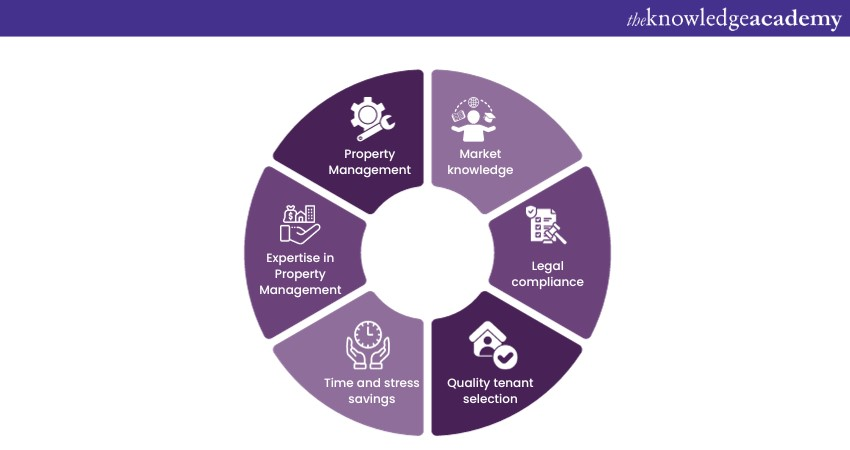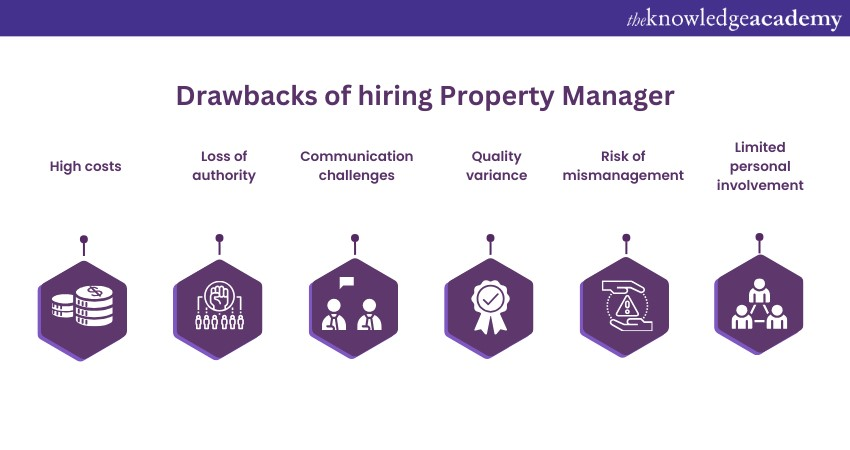We may not have the course you’re looking for. If you enquire or give us a call on 800969236 and speak to our training experts, we may still be able to help with your training requirements.
Training Outcomes Within Your Budget!
We ensure quality, budget-alignment, and timely delivery by our expert instructors.

Have you ever wondered What a Property Manager do? A Property Manager ensures that the rental properties in their portfolio are run according to the owners' specifications. They supervise and coordinate upkeep work and deal with securing and maintaining reliable tenants.
Being a Property Manager is not for everyone. A good property manager must possess astute business knowledge, effective communication, and strong organisational abilities. Additionally, they should be approachable, resourceful, and proactive, enabling them to balance people and manage business effectively. This blog will explore What Does a Property Manager do, delve deep into the roles and responsibilities of a Property Manager and the pros and cons of hiring them.
Table of Contents
1) What is a Property Manager?
2) What does a Property Manager do?
3) Advantages of hiring Property Manager
4) Drawbacks of hiring Property Manager
5) Conclusion
What is a Property Manager?
A property manager is a professional responsible for overseeing real estate properties' day-to-day operations and maintenance on behalf of property owners or investors. Their primary goal is to ensure the efficient management of the property while maximising its value and profitability. Property managers can handle various Real Estate types, including residential, commercial, and industrial properties.
Property managers perform various duties, including property marketing, tenant screening and selection, lease negotiations, rent collection, and property maintenance. They act as intermediaries between property owners and tenants, promptly addressing tenant concerns and resolving maintenance issues. Additionally, property managers often have financial responsibilities, such as managing property budgets, tracking expenses, and providing financial reports to property owners.
Their role is critical in protecting the investment of property owners, preserving the property's condition, and ensuring that it complies with local regulations and safety standards. To work efficiently, Property Managers must possess strong communication skills, organisational abilities, and a deep understanding of real estate law and market trends.

What does a Property Manager do?
Property managers play a crucial role in protecting and maintaining real estate investments for property owners. They are hired for various reasons, including managing rental properties, ensuring compliance with legal regulations, and providing a local presence for out-of-town property owners. Here are some common responsibilities and tasks performed by property managers:
1) Adheres to landlord-tenant laws and regulations
Navigating various landlord-tenant laws can be challenging for investors managing multiple properties across different regions. Engaging a property manager helps sidestep legal complications by handling these diverse regulations. Property managers, well-versed in local laws, serve as experts, ensuring compliance and preventing accidental breaches.
For instance, specific states enforce regulations on security deposit caps. A property manager familiar with the area ensures tenants are charged accurately, averting potential legal entanglements due to the property owner's unfamiliarity with local statutes.
2) Serves as a local representative for owners residing elsewhere
As on-site experts, property managers serve as a representative presence for owners residing out of town. For instance, if a property owner is accustomed to Texas but owns properties in areas like California or New York, they might struggle with the nuances of management. In such cases, property managers handle various intricate details on their behalf, including challenges like maintenance and operational concerns.
3) Manages maintenance inquiries
A property manager also manages in-person maintenance tasks. Slow landlord responses to maintenance issues can lead to tenant frustration. Thus, having an on-site manager to address tenant concerns promptly is crucial. Maintenance requests can usually vary, from appliance repairs to pest or wildlife problems, making on-site assistance crucial. A lack of landlord support for rental property issues can lead to frustration and prompt tenants to seek other options.
4) Gathers and safely transfers rental payments
Collaborating with a property manager can also mitigate the risk of extended vacancies, reducing potential financial losses. Instead of attempting remote marketing to attract prospective tenants, property owners can rely on a property manager to actively seek new renters and even facilitate lease renewals.
Prospective tenants may also feel reluctant to move into a property without a physical inspection. Additionally, showcasing the property may not be feasible if the owner resides out of state. Engaging a property manager allows property owners to have a representative on-site to address issues and queries and highlight the property to potential renters.
5) Establishing rental rates
Determining competitive rental rates is a crucial aspect of a property manager's role, which involves evaluating market values, local competition, and potential mortgage costs. Rent is often set between 0.5% and 0.8% of the property's overall value. However, additional factors like amenities, transportation access, security, and the neighbourhood's socioeconomic structure can also impact rental prices. An on-site Property Manager can assess these factors and set appropriate rent to maximise the returns on the property.
Secure your real estate success with our comprehensive Real Estate Risk Management Training and navigate the market confidently!
6) Promoting your property
Securing a photographer, crafting listings across numerous platforms, and organising viewing schedules demands time and effort. An esteemed property manager goes the extra mile by developing marketing content and actively participating in open viewings.
With many potential buyers on the internet, Property Management requires an understanding of social media marketing and using digital marketing in general. A Property Manager must be aware of the several ways of promoting the property in the digital space to maximise the pool of potential customers or tenants.
7) Assessing and selecting tenants
The tenant screening process demands significant time and effort for numerous property owners. Property managers handle this crucial step by meticulously evaluating potential tenants to ensure reliability, responsibility, and trustworthiness.
Protecting one's investment from the potential troubles associated with problematic tenants is also important. Property managers are fundamental in minimising risks and ensuring a well-managed, profitable, and secure rental environment.
8) Providing updates on the property's particulars
Being frequently present at their clients' properties, property managers play an important role in conveying concerns and proposing enhancements. Given that real estate revenue relies directly on management quality, experienced managers can anticipate potential opportunities and challenges, offering viable solutions.
Their involvement grants insights into the workings of the property, enabling them to proactively address issues, capitalise on opportunities, and effectively manage any potential complications that may emerge. Their proactive approach not only enhances property operations but also ensures that the property is financially sustainable.
9) Handling legal matters and disputes
Property managers serve as mediators, handling any legal matters and disputes that arise among tenants. They manage lease violations, address complaints, and, when necessary, represent property owners in legal proceedings, including evictions. Their knowledge of landlord-tenant laws is essential in ensuring fair and lawful resolutions.
10) Conducting property inspections
Property managers regularly perform comprehensive property inspections. These assessments involve examining the overall condition of the property, identifying maintenance needs, ensuring compliance with lease agreements, and confirming that tenants are maintaining the property appropriately. Through these inspections, they provide detailed reports to property owners and coordinate any necessary repairs or property improvements. This process ensures the property's sustained quality and adherence to agreed-upon standards.
Unlock your potential in real estate with our Real Estate Financial Modelling Training – empower your decisions and improve your investments.
Advantages of hiring Property Manager

Engaging a property manager offers many advantages, making it a sound choice for property owners looking to streamline their real estate investments. Here are some key benefits:
a) Expertise in Property Management: Property managers have the knowledge and experience to oversee real estate effectively. They are well-versed in landlord-tenant laws, property maintenance, and market trends, ensuring your property is in good hands.
b) Time and stress savings: Property Management can be time-consuming and stressful, especially for those with multiple properties. Property managers handle day-to-day tasks, including tenant communication, rent collection, and property maintenance, reducing the owner’s stress.
c) Quality tenant selection: Property managers conduct thorough tenant screening processes, often resulting in more reliable and responsible tenants. This can lead to fewer vacancies, reduced turnovers, and steady rental income.
d) Property maintenance and upkeep: Property managers ensure that properties are well-maintained, addressing repairs and maintenance. Regular inspections and maintenance prevent minor issues from becoming major problems, potentially saving owners money in the long run.
e) Market knowledge: Property managers possess valuable insights into local real estate markets, helping owners set competitive rental prices. This expertise maximises rental income while keeping vacancies at bay.
f) Legal compliance: Staying compliant with complex landlord-tenant laws and regulations is vital. Property managers understand these laws and ensure property operations adhere to them, mitigating legal risks.
Unlock your potential with our Investment and Trading Training and learn the art of smart investing and trading to secure your financial future.
Drawbacks of Hiring Property Manager

While hiring a property manager can provide plentiful advantages, it's vital to consider the potential drawbacks associated with this decision. Here are some key disadvantages:
a) High costs: Property managers typically charge fees for their services, which can affect your rental income. These costs may include monthly management fees, leasing fees, maintenance fees, and more. Evaluating whether the expenses associated with hiring a property manager align with your financial goals is essential.
b) Loss of authority: When you hire a property manager, you relinquish some control over your property. They make decisions on your behalf, and their management style may not always align with your preferences. This can be annoying for property owners who want more direct involvement.
c) Communication challenges: Property managers act as intermediaries between you and your tenants. While this can be beneficial in resolving conflicts, it may also result in communication challenges. Misunderstandings or delays in conveying important information can be an impediment.
d) Quality of Property Manager can vary: The quality of Property Management services can vary significantly. Hiring an inexperienced or unprofessional property manager can lead to inadequate tenant screening and poor maintenance, ultimately affecting your property's condition and profitability.
e) Risk of mismanagement: Property managers sometimes may not act in your property's best interests. Instances of mismanagement or even fraud have been reported. Proper due diligence in selecting a trustworthy property manager can reduce this risk.
f) Limited personal involvement: If you enjoy the hands-on aspects of Property Management or view it as a learning experience, hiring a property manager might leave you detached from your real estate investment.
Unlock Your Potential and Elevate Your Real Estate Career – Join the Real Estate Agent Masterclass now!
Conclusion
Understanding What a Property Manager do is vital for successful real estate investments. From tenant relations to property maintenance, their multifaceted role significantly impacts the property's value and the satisfaction of its occupants. Recognising and appreciating their contributions is fundamental to effective Property Management.
Frequently Asked Questions
Upcoming Business Skills Resources Batches & Dates
Date
 Real Estate Agent Course
Real Estate Agent Course
Fri 20th Dec 2024
Fri 17th Jan 2025
Fri 21st Mar 2025
Fri 16th May 2025
Fri 18th Jul 2025
Fri 19th Sep 2025
Fri 21st Nov 2025







 Top Rated Course
Top Rated Course


 If you wish to make any changes to your course, please
If you wish to make any changes to your course, please


